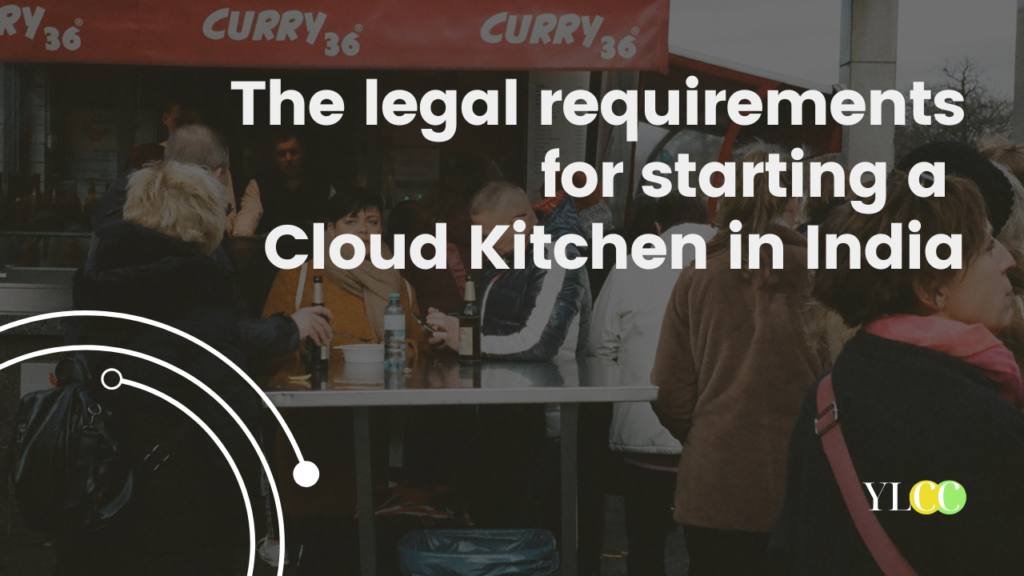
Let’s take a journey to the land of spices and flavors, India, where the concept of cloud kitchens is sizzling hot! Are you a foodie with a passion for entrepreneurship? Do you dream of starting your own cloud kitchen business? Well, hold on to your aprons because we are about to dive into the legal must-knows for starting a cloud kitchen in India!
Cloud kitchens, also known as ghost kitchens or virtual kitchens, are like food laboratories where chefs experiment with flavors and ingredients to create mouth-watering dishes that are only a click away. With the rise of food delivery apps and the changing preferences of customers, cloud kitchens have become the latest buzz in the Indian food industry.
But before you start taking orders and firing up your ovens, it is important to comply with the legal requirements and regulations in India. Here are the legal must-knows for starting a cloud kitchen in India:
Get Legally Sauced: Registering Your Cloud Kitchen Business in India
If you’re ready to take on the cloud kitchen world in India, the first thing you need to do is get your business registered! It’s like getting a ticket to the coolest party in town, except this one’s all about food.
Now, you may be wondering, “What’s the deal with business registration?” Well, let me tell you, it’s like getting your foodie superhero cape on! You’ll be officially recognized as a food business and have the power to cater to the taste buds of all those hungry customers out there.
You can choose to register your cloud kitchen as a sole proprietorship, partnership firm, or private limited company. Think of it like picking out the perfect outfit for a food fashion show! Just make sure to choose the right fit for your business structure and requirements.
Get Your Fries and License: Obtain Food License for Your Cloud Kitchen
The Food Safety and Standards Authority (FSSAI) is the boss when it comes to making sure our food is safe and tasty. If you’re planning to start a cloud kitchen, you better get your FSSAI food license first! But hold your horses, because the type of license you need will depend on the size and nature of your business. Don’t worry, FSSAI has made it easy-peasy by dividing food businesses into three categories based on their turnover. The type of license you need depends on the size of your operation and the nature of your business.
If your annual turnover is less than Rs.12 lakhs, you can apply for a basic FSSAI food safety registration. But as you grow and cross the Rs.12 lakh bar, you need to upgrade to a state license. So make sure you get your FSSAI license, or you might get into some hot water!
Stay Tax-Savvy while Cooking Up a Storm: Make Sure You Have Your GST Registration!
GST is a vital aspect of any business in India, including cloud kitchens, and it’s essential to register for it if your annual turnover is over Rs. 20 lakhs. This unified tax system replaced multiple indirect taxes, making it easier for businesses to comply with tax regulations.
Failing to register for GST can result in legal consequences, and you don’t want to face that hassle when you’re busy cooking up some tasty dishes. So, make sure you get your GST registration done and focus on what you do best – whipping up delicious meals for your customers!
Seal the Deal with a Trademark: Protect Your Brand’s Mojo!
As a cloud kitchen, you’re cooking up some delicious treats that will leave your customers licking their plates clean. But how will they remember your brand name and logo in the long run? That’s where trademarks come in. Trademarks not only help you establish your unique identity but also safeguard it from unauthorized use by others.
Registering your brand name and logo as a trademark is a must-do for any serious cloud kitchen owner. It may take up to a year and a half, but the process is worth it. Think of it as the cherry on top of your delicious culinary creations. So, don’t wait too long to start the trademark registration process and start building your brand stardom today!
Don’t Wing It With Your Delivery Partners: Contracts are Key for Cloud Kitchens!
Nowadays, delivery platforms like Swiggy, Zomato etc have become an integral part of the food industry, and cloud kitchens are no exception. But, before you start delivering your delicious dishes to hungry customers, make sure you have a solid contract in place with your delivery partners. This will help ensure a smooth partnership and avoid any legal hassles in the future.
Your contract should clearly outline important terms like commission rates, delivery charges, cancellation policies, and liability for any damages or losses. Don’t be afraid to negotiate these terms to ensure a fair deal for your business. With a strong contract in place, you can focus on what you do best – cooking up a storm in the kitchen and satisfying your customers’ cravings!
Get Cookin’ with the Law: Navigating Labour Laws for your Cloud Kitchen in India
One thing you can’t forget is to comply with the labour laws in India. These laws are in place to protect both employers and employees, and you don’t want to end up on the wrong side of the law. Make sure you follow the rules for minimum wages, working hours, overtime pay, and social security benefits.
It’s also important to note that there are different labour laws in India for different types of workers, such as permanent employees, contract workers, and casual workers. It’s important to understand the legal requirements for each type of worker and ensure compliance with the relevant laws. Complying with labour laws can be complex, but it’s essential for the smooth functioning of your cloud kitchen and to avoid any legal issues.
Stay Safe and Sizzle on with Insurance for Your Cloud Kitchen!
We know you love cooking up a storm in your virtual kitchen, but have you considered what could happen if something goes wrong? Don’t worry, we’re not trying to rain on your parade – we just want to help you protect your business from unexpected events.
Types of Insurance for Cloud Kitchens:
- Product Liability Insurance: This policy is your go-to if a customer accuses your food of making them sick. We know your cooking is top-notch, but accidents can happen. This policy will cover the cost of legal fees and settlements if someone files a lawsuit against your cloud kitchen for food poisoning, allergies, or other illnesses caused by your food.
- Workers’ Compensation Insurance: Your employees are the backbone of your cloud kitchen, and their safety is paramount. Workers’ compensation insurance provides financial protection to your employees in case of injury or illness during work. This policy covers medical expenses, lost wages, and disability benefits to employees who are injured or become ill while working in your virtual kitchen.
Cooking with Safety and Health in Mind: How to Keep Your Cloud Kitchen Hot and Safe!
As a cloud kitchen owner, you are responsible for providing safe and healthy food to your customers. This not only includes the quality of the food but also the safety of the kitchen where it is prepared. Here are two essential certifications you must obtain to ensure your cloud kitchen is up to the mark:
- Fire Safety Clearance: Fire can be a huge risk in a kitchen, with all the heat and equipment that generates it. Obtaining a fire safety clearance certificate from the local fire department ensures that your kitchen has all the necessary equipment and measures to prevent and tackle a fire. This includes fire extinguishers, smoke detectors, fire alarms, and emergency exits.
- Health and Sanitation Certification: Nobody wants to eat in an unhygienic restaurant, and the same goes for cloud kitchens. Adhering to the health and sanitation standards prescribed by the Food Safety and Standards Authority of India (FSSAI) is a must. You must obtain a health and sanitation certificate from the local health department, which checks if your kitchen meets the required standards for cleanliness, food storage, waste disposal, pest control, and personal hygiene.
Conclusion
Starting a cloud kitchen business in India can be a daunting task, especially when it comes to legal and regulatory compliance. However, with the right knowledge and preparation, it can be a successful and rewarding venture.
Obtaining the necessary licenses and permits, complying with labor laws, obtaining insurance coverage, and adhering to health and safety standards are essential legal must-knows for every cloud kitchen owner in India. Ensuring compliance with all the relevant laws and regulations can help avoid legal complications and ensure the smooth functioning and success of your cloud kitchen business. So, don’t forget to do your homework and get all the necessary legal requirements in order to serve delicious food to your customers and run a sustainable cloud kitchen business in India.
This article has been written by Team YLCC. For any other queries, reach out to us at: queries.ylcc@gmail.com






